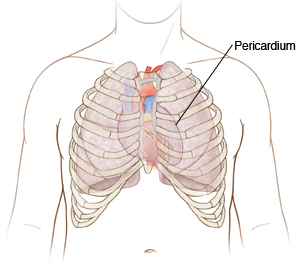Pericarditis is inflammation of the thin sac (membrane) that surrounds the heart. This sac is called the pericardium.
The pericardium holds the heart in place and protects it from infection. Normally, there is a small amount of fluid between the inner and outer layers of the pericardium. This fluid keeps the layers from rubbing as the heart moves to pump blood. With pericarditis, there may be an increase in the amount of fluid. Sometimes this fluid can restrict how well the heart pumps and it may need to be removed. Pericarditis may last for 2 to 6 weeks.
Home care
Follow these guidelines when caring for yourself at home:
-
It’s important to rest until you feel better. Don’t do any strenuous activity during this time. Talk with your health care provider about the type of activities that are safe for you to do.
-
You may use ibuprofen or naproxen to control pain, unless another medicine was prescribed. If you have chronic liver or kidney disease, talk with your provider before using these medicines. Also talk with your provider if you’ve had a stomach ulcer or gastrointestinal bleeding. Acetaminophen may not help this type of pain as much as ibuprofen or naproxen.
-
Stay away from known causes and risk factors.
Follow-up care
Follow up with your health care provider, or as advised. Additional testing may be needed.
When to get medical advice
Contact your health care provider right away if you have:
-
Mild shortness of breath or more pain with breathing.
-
Mild weakness or dizziness.
-
A cough with a small amount of dark-colored phlegm (sputum) or blood.
-
Fever of 100.4°F (38ºC) or higher, or as advised by your provider.
-
Leg swelling.
-
A fast pulse rate that doesn't go away with rest.
Call 911
Call
-
A change in the type of pain. This means if it feels different, becomes more severe, lasts longer, or starts to spread into your shoulder, arm, neck, jaw, or back.
-
Fainting, or severe weakness or dizziness.
-
A cough with a large amount of dark-colored phlegm (sputum) or blood.
-
Severe shortness of breath or pain with breathing.



